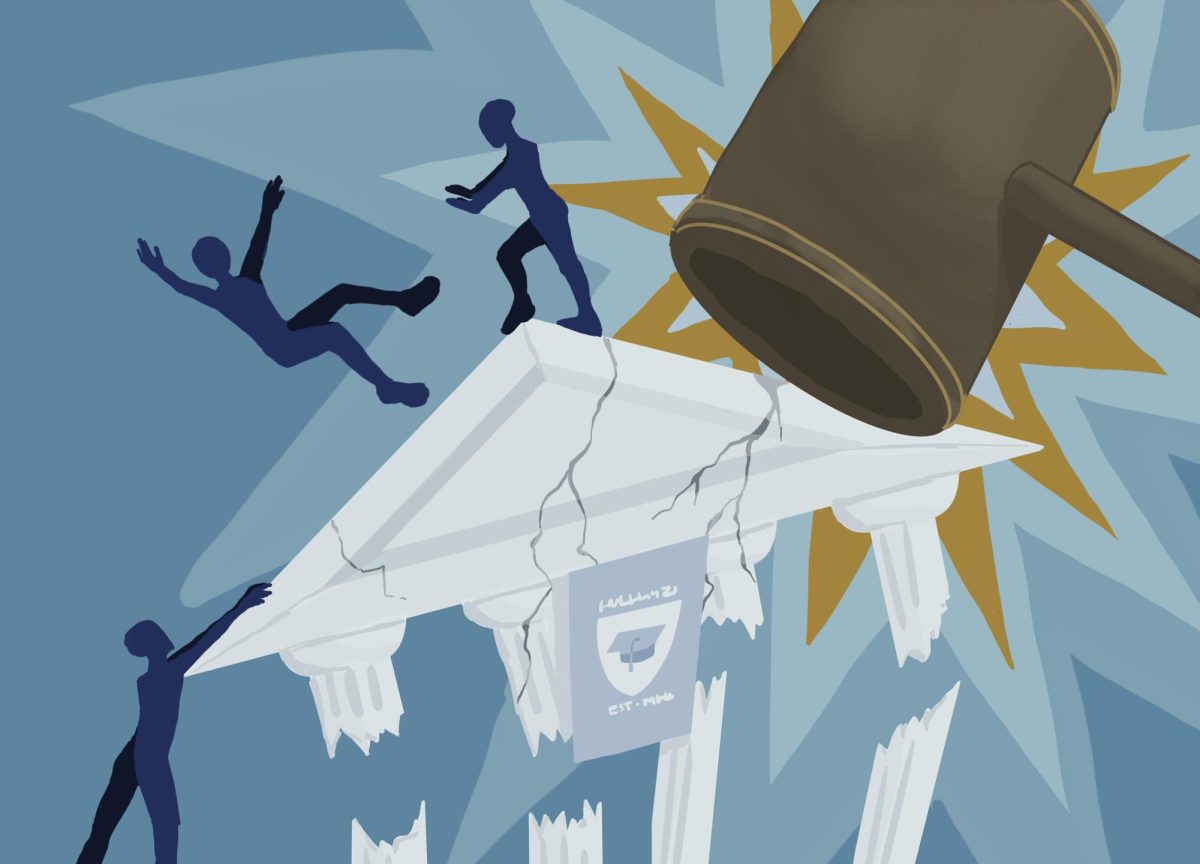In an environment as dedicated to excelling in the college admissions process as Harker, every policy and factor matters. Affirmative action always stood out, bringing the topic to center stage this June. Some mourned the ban of affirmative action, some anticipated a more equal shot at college admissions, but everybody had an opinion. Will the ban really enable equality?
Affirmative action as we know it today originated in the 1960s in order to create equal opportunity for people regardless of race or ethnicity. More recently, colleges used affirmative action “as one element in a range of factors” for the purpose of “achieving the benefits to be derived from a diverse student body.” In this same case from 1978, the Supreme Court forbade colleges from using race-based admissions to right past discrimination or create race-based quotas. On June 29, the Supreme Court struck down affirmative action in 6-2 and 6-3 decisions, citing that affirmative action is a form of racial discrimination.
In a 24-hour survey conducted on the Harker Aquila Instagram on Aug. 14, 34% out of 118 respondents agreed with the Supreme Court ruling, with an additional 23% who strongly agreed. 21% disagreed, and 22% strongly disagreed. A sentiment especially prevalent at Harker, opponents of affirmative action characterize it as forms of “reverse racism” and “reverse discrimination” which undermine the idea of a meritocracy.
The model minority myth depicts a minority group that achieves a higher socioeconomic status through their hard work and innate talent. This myth of success represented as the truth of an American meritocracy is a way in which individuals can dismiss systematic disenfranchisement and lack of access to resources like Advanced Placement (AP) classes or qualified teachers as a lack of ‘hard work.’ All demographics boast success stories, but their existence does not negate greater trends and barriers certain groups face. Students do not exist in a vacuum, so should the analysis of their efforts take place in one?
At Harker, we are fortunate to be able to learn from qualified teachers, meet with easily-accessible college counselors, utilize resources to pursue a variety of activities and have access to many other privileges. Even though this doesn’t guarantee admission, it significantly helps our chances of being admitted by contributing to a strong college application. With these advantages, we should look to acknowledge the greater barriers other students may face and prevent the model minority myth from coloring our perception of the world.
Though affirmative action succeeds at creating diverse classes, it only acts as a band-aid to deeper-rooted racial and socioeconomic disparities. Even so, we cannot ignore the imperfections of the real world in favor of tearing off band-aids for not being all-in-one fixes to the skewed status quo. Affirmative action bans, such as the one in the University of California (UC) system in 1996, result in little impact on white and Asian students’ professional opportunities after college. However, underrepresented minorities, like Hispanic, African American and Native American students, suffered both in matriculation to higher education and salaries after college.
The narrative of college admissions serving as a zero-sum game only drives further wedges between minority groups, as the internalized model minority myth correlates to anti-affirmative action and anti-Black sentiments. Even though the model minority myth provides the illusion of success and of upward mobility, minorities pushing each other down only preserves a system which maintains the status quo of inequity. Additionally, as a majority Asian community dedicated towards education. This allows competitiveness to pervade the environment at Harker, where many students have a similar cutthroat notion of college admissions.
“Affirmative action” has transformed into a buzzword, ironically leaving behind the nuances of the policy and transforming into a reason to blame others. We must aim to look past generalizations and towards nuance in order to ground ourselves in the real world and other people, not in hypercompetitive anxiety and narratives like the model minority myth.


















![“[Building nerf blasters] became this outlet of creativity for me that hasn't been matched by anything else. The process [of] making a build complete to your desire is such a painstakingly difficult process, but I've had to learn from [the skills needed from] soldering to proper painting. There's so many different options for everything, if you think about it, it exists. The best part is [that] if it doesn't exist, you can build it yourself," Ishaan Parate said.](https://harkeraquila.com/wp-content/uploads/2022/08/DSC_8149-900x604.jpg)




![“When I came into high school, I was ready to be a follower. But DECA was a game changer for me. It helped me overcome my fear of public speaking, and it's played such a major role in who I've become today. To be able to successfully lead a chapter of 150 students, an officer team and be one of the upperclassmen I once really admired is something I'm [really] proud of,” Anvitha Tummala ('21) said.](https://harkeraquila.com/wp-content/uploads/2021/07/Screen-Shot-2021-07-25-at-9.50.05-AM-900x594.png)







![“I think getting up in the morning and having a sense of purpose [is exciting]. I think without a certain amount of drive, life is kind of obsolete and mundane, and I think having that every single day is what makes each day unique and kind of makes life exciting,” Neymika Jain (12) said.](https://harkeraquila.com/wp-content/uploads/2017/06/Screen-Shot-2017-06-03-at-4.54.16-PM.png)








![“My slogan is ‘slow feet, don’t eat, and I’m hungry.’ You need to run fast to get where you are–you aren't going to get those championships if you aren't fast,” Angel Cervantes (12) said. “I want to do well in school on my tests and in track and win championships for my team. I live by that, [and] I can do that anywhere: in the classroom or on the field.”](https://harkeraquila.com/wp-content/uploads/2018/06/DSC5146-900x601.jpg)
![“[Volleyball has] taught me how to fall correctly, and another thing it taught is that you don’t have to be the best at something to be good at it. If you just hit the ball in a smart way, then it still scores points and you’re good at it. You could be a background player and still make a much bigger impact on the team than you would think,” Anya Gert (’20) said.](https://harkeraquila.com/wp-content/uploads/2020/06/AnnaGert_JinTuan_HoHPhotoEdited-600x900.jpeg)

![“I'm not nearly there yet, but [my confidence has] definitely been getting better since I was pretty shy and timid coming into Harker my freshman year. I know that there's a lot of people that are really confident in what they do, and I really admire them. Everyone's so driven and that has really pushed me to kind of try to find my own place in high school and be more confident,” Alyssa Huang (’20) said.](https://harkeraquila.com/wp-content/uploads/2020/06/AlyssaHuang_EmilyChen_HoHPhoto-900x749.jpeg)





Will Gonsior • Sep 20, 2023 at 4:59 pm
Great article, well researched and opinionated as I like them 🙂
How do you know that this is seen as reverse discrimination at Harker? A rebuttal to affirmative action that I have heard is that it has kept schools complacent when they should be making admissions more socioeconomically equal than they are right now, that the best way to help underprivileged ethnic groups is to target those with worse economic situations, because when those getting helped first are members of disadvantaged groups who have more resources, then few things change for that group on the whole.